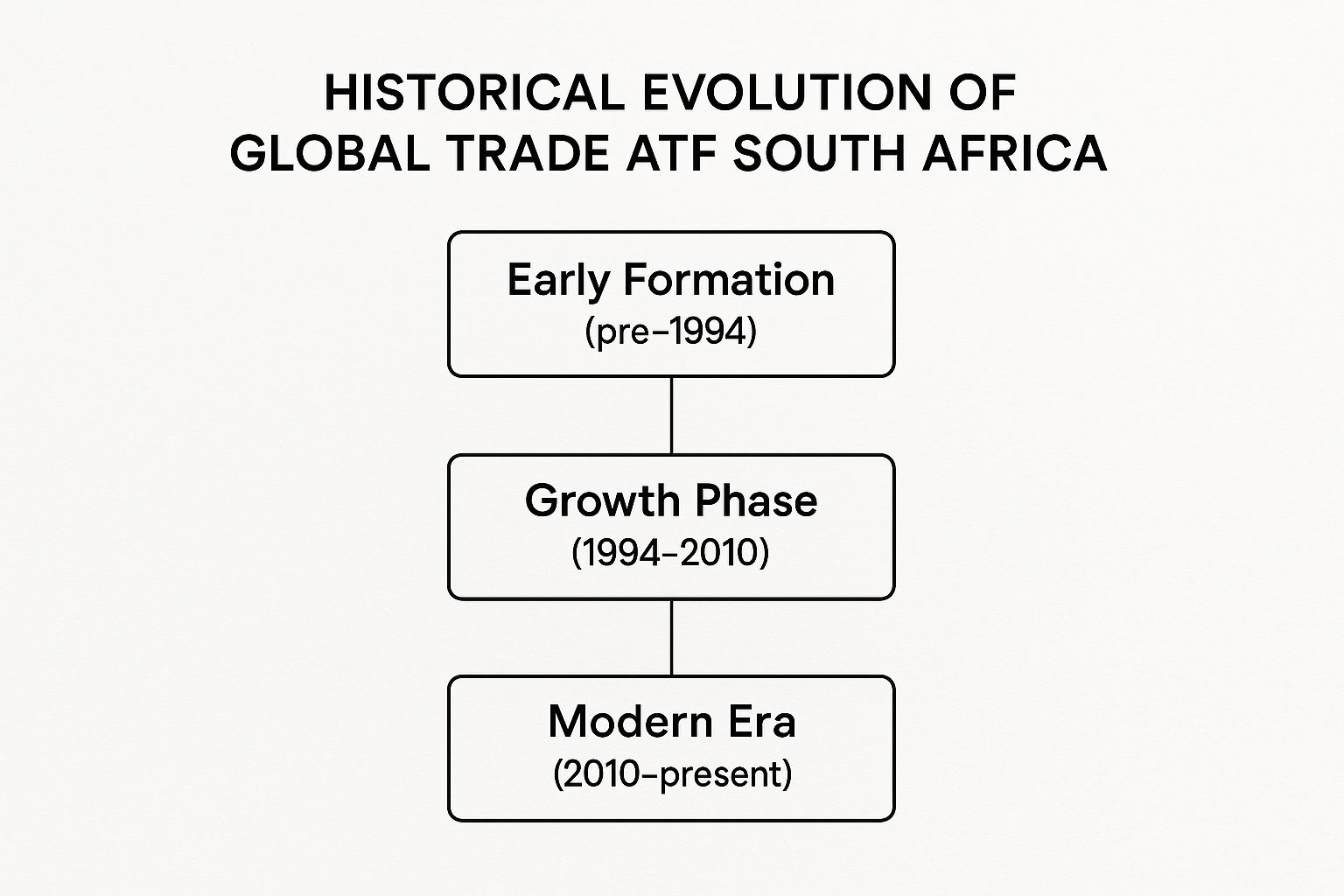Understanding Global Trade ATF: Your Gateway To International Commerce
Think of Global Trade ATF (Alternative Trade Finance) not as a stuffy bank loan, but as a nimble speedboat. Traditional bank financing can feel like a massive cargo ship – slow, rigid, and difficult to maneuver. ATF, on the other hand, is built for speed and adaptability, crucial in today's rapidly changing global market.

This graph of South Africa's export trends paints a clear picture of the fluctuating nature of international trade. It's not a flat line; it's a dynamic landscape requiring flexible financial solutions. Just look at the numbers: in 2023, South African exports totaled roughly $124.70 billion, down 8.17% from $135.80 billion in 2022. This highlights how vital global trade is to South Africa and how even small shifts can have a big impact. Want to explore these trends further? Dive deeper into the data here.
Real-World Examples of ATF in Action
Let's move from the abstract to the concrete. Imagine a Cape Town wine exporter on the verge of landing a major contract with a buyer in Asia. The deal is time-sensitive, but traditional financing is proving too slow. Enter ATF. By securing alternative financing, the exporter closed the deal, opening doors to a whole new market.
Now, picture a Johannesburg manufacturer aiming to significantly expand their export capacity. They have the ambition, but not the readily available capital. Traditional loans present roadblocks, but a tailored ATF solution provides the necessary funds, fueling rapid growth.
These aren't just isolated incidents. They represent how Global Trade ATF in South Africa can be a powerful strategic tool. It's not a one-size-fits-all product; it adapts to your unique business needs, empowering you to seize opportunities on the global stage.
Navigating South Africa's Trade Finance Ecosystem Like A Pro
Think of South Africa's trade finance world as a vibrant marketplace. Established banks are like large department stores, offering a broad range of services. Meanwhile, fintech companies are like specialized boutiques, catering to niche needs with agility and innovation. Each plays a distinct role and operates at its own pace, under the watchful eye of the South African Reserve Bank (SARB). Understanding the SARB's regulations isn't about memorizing every rule, but rather about recognizing the opportunities they present.

This infographic shows the evolution of global trade ATF in South Africa, highlighting three key periods: pre-1994, 1994-2010, and 2010-present. It illustrates the growing complexity of trade finance over time, particularly in the current era.
Seizing Opportunities in a Changing Landscape
Recent regulatory changes have opened up exciting new possibilities for businesses in the know. For instance, a Durban-based logistics company recently secured better financing terms with a non-traditional lender, outperforming their usual bank. In another case, a small agricultural exporter in the Free State gained access to new international markets by understanding the SARB's evolving stance on trade finance.
These examples highlight the power of choosing the right financial partner – one aligned with your specific trading activities, risk tolerance, and growth ambitions. Just as you wouldn't use a small truck (a bakkie) to transport tons of maize, you shouldn't use complex trade finance solutions for a small, local transaction.
Finding the right fit within this diverse financial ecosystem is crucial for unlocking growth in international trade. Knowing the landscape can turn regulatory complexity into a competitive edge.
To better understand this landscape, let's look at the key regulatory bodies shaping trade finance in South Africa. The table below outlines their roles and requirements, and how they impact ATF.
The following table provides a breakdown of the key players in the South African trade finance regulatory framework. Understanding their roles and influence is critical for successful navigation of the ATF landscape.
| Regulatory Body | Primary Role | Key Requirements | Impact on ATF |
|---|---|---|---|
| South African Reserve Bank (SARB) | Sets monetary policy, regulates banks, and manages exchange controls. | Maintains financial stability and promotes economic growth. Requires banks to adhere to specific capital adequacy and liquidity ratios. | Influences the availability and cost of trade finance. Impacts exchange rate fluctuations and cross-border transactions. |
| Financial Sector Conduct Authority (FSCA) | Supervises and regulates financial institutions, including banks and fintech companies. | Ensures fair treatment of customers and maintains market integrity. Requires adherence to consumer protection laws. | Impacts the conduct of trade finance providers and their interactions with businesses. |
| National Treasury | Develops and implements fiscal policy. | Manages government finances and promotes economic stability. Sets taxes and tariffs related to international trade. | Influences the overall economic environment for trade and the cost of doing business. |
| International Chamber of Commerce (ICC) | Sets global standards for trade finance, including letters of credit and guarantees. | Promotes standardization and efficiency in international trade transactions. Publishes rules and guidelines for trade finance instruments. | Provides a framework for conducting international trade transactions, which South African businesses must adhere to. |
This table summarizes the major regulatory bodies impacting ATF in South Africa. Note the interconnectedness of these institutions and how their roles influence various aspects of trade finance. Understanding this framework allows businesses to better anticipate regulatory changes and adapt their strategies accordingly. Choosing the right partner within this framework – whether a traditional bank or a nimble fintech company – is crucial for success in global trade.
The Real Story Behind South Africa's Trade Performance Numbers
Let's explore South Africa's trade statistics and what they mean for businesses like yours. Imagine the trade balance as a financial barometer. Once you learn to read it, you can anticipate shifts in the economic weather and spot emerging opportunities. We'll go beyond simple export figures and delve into the underlying currents driving real business growth.

This snapshot from the South African Revenue Service (SARS) offers a glimpse into the country's trade data. It breaks down imports and exports, providing valuable information for businesses involved in global trade activities focusing on South Africa (global trade AFT in South Africa). This data helps reveal important trends and patterns for informed decision-making.
Uncovering Hidden Opportunities
Have you ever wondered why some months consistently outperform others? Or which sectors are quietly building momentum? Understanding these nuances is key to unlocking opportunities within global trade AFT in South Africa. For instance, how can fluctuations in the South African Rand create advantageous openings?
South Africa has historically maintained a positive trade balance. Recent data from SARS (April 2025) shows exports valued at approximately R166,173,907,831 and imports at R152,097,083,433. Explore detailed trade statistics. These figures illustrate the dynamic nature of South Africa's trade and its potential.
We'll also look at how changes in commodity prices impact different regions. For example, a downturn in mining in one province could create unexpected logistics opportunities in another. Regional variations are key to pinpointing specific opportunities related to global trade AFT in South Africa.
Turning Insights into Action
Consider the case of an automotive parts supplier in the Eastern Cape. They optimized their AFT timing by recognizing seasonal import patterns. Or the Western Cape food processor who capitalized on rand volatility to expand into new African markets. These are real-world examples of how understanding global trade AFT in South Africa can create strategic advantages.
Let's look at the practical application of these insights. To illustrate, imagine a table showing South Africa's monthly trade performance:
South Africa Trade Balance Analysis Monthly trade performance showing exports vs imports and trade surplus trends
| Month | Exports (ZAR) | Imports (ZAR) | Trade Balance | % Change |
|---|---|---|---|---|
| January 2025 | 150,000,000,000 | 140,000,000,000 | 10,000,000,000 | 2% |
| February 2025 | 155,000,000,000 | 145,000,000,000 | 10,000,000,000 | 0% |
| March 2025 | 160,000,000,000 | 150,000,000,000 | 10,000,000,000 | 0% |
| April 2025 | 166,173,907,831 | 152,097,083,433 | 14,076,824,398 | 40% |
(Note: The data in this table is illustrative for demonstration purposes and does not reflect actual figures. Please refer to the provided SARS link for accurate data.)
This table simplifies complex information, allowing businesses to quickly identify trends in exports, imports, and the trade balance. The significant percentage change in April highlights a potential area for further investigation.
Understanding the Ripple Effect
Finally, we'll explore how currency fluctuations create ripple effects throughout the supply chain. Think of it like a pebble dropped in a pond. A weaker rand, for example, can make South African exports more competitive, boosting demand. Conversely, a stronger rand can make imports more affordable, potentially impacting local producers. Understanding these dynamics helps businesses anticipate market changes and adapt accordingly. Recognizing the interplay of currency, imports, and exports is essential for navigating the complexities of global trade AFT in South Africa.
Who Actually Qualifies For Global Trade ATF In South Africa
Qualifying for global trade ATF (Alternative Trade Finance) in South Africa isn't a simple checklist exercise. It’s more like pitching your business to a discerning investor. Forget ticking boxes; focus on telling a compelling story that showcases your strengths. Just like different investors look for different things, various ATF lenders have unique criteria.
Understanding The Nuances Of Eligibility
Savvy businesses understand this and tailor their approach accordingly. Imagine a tech startup in Pretoria with a limited trading history. They might not have years of financial statements to impress a lender. Instead, they could highlight their strong intellectual property portfolio, demonstrating future potential even with a short track record. This focus on innovation could be a strong selling point for certain ATF providers.
On the other hand, a well-established textile manufacturer in KwaZulu-Natal with solid financials might initially be overlooked if they rely solely on past performance. Instead, by emphasizing their market access strategies and expansion plans, they shift the focus from historical data to future growth potential, making them a much more attractive prospect.
Beyond The Balance Sheet
ATF evaluators look beyond traditional metrics. It's not always about hitting a specific turnover target or having a perfect credit score. Instead, many lenders prioritize qualitative factors like market opportunity, the experience of the management team, and the overall business strategy. These factors often paint a richer picture than simply meeting numerical benchmarks.
One common misconception is that you need years of export experience to qualify. While experience helps, some providers prioritize future potential, focusing on thorough market analysis and the management team’s capability. This opens doors for businesses new to exporting, as long as they can demonstrate a clear vision and a robust execution plan.
Finding The Right Fit
Just as there are different types of investors, there are different types of ATF products. A small business looking for short-term financing for a single export order will have different needs than a larger company seeking long-term funding for global expansion. Understanding these nuances is essential. Finding the right ATF product is like finding the right piece of a puzzle; it needs to fit your specific business needs.
Positioning your business narrative correctly can be the difference between being seen as a risky venture and a promising investment. It's about crafting a compelling story tailored to the specific lender, highlighting the elements that resonate most with their investment criteria. This targeted approach significantly increases your chances of securing the funding you need.
Your Strategic Roadmap Through The ATF Application Journey
Think of your ATF application like planning a cross-country road trip. You wouldn't just hop in the car and start driving, would you? You'd map out your route, pack essential supplies, and anticipate potential detours. Similarly, a successful ATF application requires careful planning and a clear understanding of the terrain. We'll explore each step, using real-world examples and practical advice to guide you on your journey.
The Importance of the Initial Consultation
The initial consultation is like choosing the right vehicle for your road trip. A compact car might be fine for a short jaunt, but a sturdy SUV is better equipped for a long, challenging journey. During this consultation, you'll discuss your specific needs and how global trade ATF in South Africa can help you reach your destination. Asking the right questions, like inquiring about specific documentation requirements, can save you valuable time and prevent unnecessary delays down the road.
Key Documents and Decision-Making
Just as a well-maintained engine is crucial for a smooth ride, your financial documents are important for demonstrating your business's health. However, lenders also want to see that you have a good sense of direction. A well-defined export plan or market analysis, like a detailed map, shows that you understand the landscape and have a clear path forward. This demonstrates your strategic vision and strengthens your lender's confidence in your journey.
Navigating Potential Roadblocks
Even with the best planning, unexpected roadblocks can occur. A flat tire, a sudden storm, or road closures can throw off your schedule. Similarly, businesses can face unforeseen challenges during the ATF application process. By anticipating potential issues, like cash flow fluctuations, and including contingency plans in your application, you show lenders that you're prepared for anything. This foresight, like having a spare tire in your car, provides reassurance and increases your chances of a successful journey.
Avoiding Common Mistakes
Some mistakes, like forgetting your driver's license or running out of gas, can bring your road trip to a screeching halt. In the ATF application process, common errors such as submitting incomplete applications or failing to address lender queries promptly can significantly delay your progress. These seemingly small oversights can create a negative impression and hinder your access to crucial funding.
Practical Tools and Insider Tips
This section provides practical templates and checklists, like a trusted travel guide, to help you navigate the ATF application process. We also offer insider tips on how to present complex business situations in a way that highlights your strengths and builds trust with potential financing partners. This guidance empowers you to present your business in the best light possible, increasing your chances of approval and setting you on the road to success.
Strategic Benefits That Transform Your Global Trade Game

Global trade Advanced Foreign Trade (ATF) in South Africa offers more than just access to funds. Think of it less like a simple loan and more like gaining access to a whole new set of tools. ATF is a strategic toolkit that can fundamentally reshape how South African businesses compete on the global stage. It's like trading in your basic hammer for a fully equipped workshop, empowering you to build a much stronger, more globally competitive business.
Real-World Transformations Through Global Trade ATF South Africa
Let's look at a real-world example. Imagine an agricultural equipment manufacturer in Bloemfontein. Faced with the challenges of international trade, they didn't just use ATF for financing. They used it strategically to improve their standing with international suppliers. By demonstrating their ability to secure prompt payment through ATF, they negotiated better terms, ultimately reducing their costs by a significant 15% and gaining increased payment flexibility. This wasn't a one-off discount; it created a lasting cost advantage, strengthening their overall financial position.
Similarly, consider a logistics company in Port Elizabeth. They leveraged the improved cash flow from ATF to offer more competitive rates to their clients. This opened doors to contracts they previously couldn't even bid on, resulting in significant expansion of their market share. For them, ATF wasn't just about financing; it was the key to unlocking new business opportunities.
From Reactive to Proactive: Seizing Global Opportunities
These stories highlight how global trade ATF allows businesses to shift from reacting to international markets to proactively shaping their presence within them. Instead of merely responding to events, they can anticipate and capitalize on opportunities. Think about the advantage of reacting quickly to currency fluctuations or seasonal demand surges. Imagine seizing those time-sensitive deals that traditional financing would make you miss. ATF provides the agility needed to navigate the dynamic global landscape.
For instance, picture a seasonal spike in demand for South African citrus fruit in Europe. With ATF, an exporter can quickly access the working capital needed to ramp up shipments, maximizing profits during this crucial period. This proactive approach simply isn't feasible with slower, more traditional financing methods.
Building a Sustainable Competitive Moat
These strategic benefits accumulate over time, creating a protective barrier around your business—a competitive "moat." It's not about short-term wins, but about building sustainable advantages that endure long after the initial financing is repaid. Global trade ATF empowers South African businesses to invest in growth, expand their global reach, and create a more resilient future. It's about strategically positioning your business for long-term success in the international arena.
Building Sustainable Compliance While Maximizing ATF Value
Smart compliance with global trade African Trade Finance (ATF) in South Africa isn't about simply dodging penalties. It's about creating systems that boost your trade finance capabilities. Think of it like laying the groundwork for a house. A strong foundation isn’t exciting, but it's vital for stability and lasting value. Likewise, solid compliance practices, while not glamorous, are key to getting the most out of ATF and establishing trust with finance providers.
Turning Compliance into a Competitive Advantage
Successful South African businesses recognize that compliance can be a real competitive edge. They use meticulous record-keeping not only to satisfy regulators, but also to secure better terms with lenders. Picture this: you're meeting with a potential ATF provider and you present them with a perfectly organized record of your international transactions. This instantly demonstrates reliability and transparency, making you a less risky and more appealing borrower. This can unlock better financing terms, larger credit lines, and access to top-tier financial products.
Let’s say two businesses are applying for global trade ATF in South Africa. One has a disorganized approach to documentation, while the other maintains impeccable records. Which one do you think will impress a lender? The answer is obvious. Organized documentation builds trust. It shows you're a serious operator, and that translates into real financial advantages.
Streamlining Operations Through Compliance Frameworks
Effective compliance frameworks don't create extra paperwork; they actually streamline operations. Think of organizing your toolbox. Having a designated spot for every tool might seem like extra effort at first, but it saves you tons of time and frustration down the line. Similarly, a well-designed compliance system can automate processes, reduce errors, and free your team to focus on what matters most: growing your business.
Imagine a business using a digital platform like Salesforce to manage all their ATF-related documentation. This system automatically tracks transactions, generates reports, and ensures everything aligns with regulations. Not only does this reduce the risk of errors, but it also saves precious time and resources. It's like having a dedicated assistant handling all the administrative tasks, leaving you free to focus on strategic decisions.
Practical Solutions for South African Challenges
Navigating South Africa's unique regulatory landscape, including currency controls and documentation requirements, can be tricky. But there are practical solutions for common compliance hurdles. Let’s look at a few:
- Currency Control Navigation: Partnering with an experienced ATF provider can simplify navigating South Africa's exchange control rules. They can guide you through the complexities, ensuring smooth and compliant cross-border transactions.
- Documentation Best Practices: Standardized documentation procedures, templates, and digital tools can streamline compliance and minimize errors.
- Building Trust with Lenders: Consistent compliance fosters confidence with ATF providers, leading to more financing options and better terms.
Consider a business struggling with South Africa's complex currency controls. By partnering with a locally experienced ATF provider, they simplify the process, reduce delays, and can concentrate on their core business. This shows how the right partner can transform a potential compliance headache into a streamlined process.
Compliance Excellence: Your Pathway to Premium Financing
In the end, compliance excellence sets you apart in global trade. It builds trust with lenders, opens doors to premium financing products unavailable to less organized competitors, and positions your business for sustained growth in the international market.
Ready to simplify your cross-border payments and unlock the full potential of global trade? Explore Zaro, the fintech platform transforming international transactions for South African businesses. Discover Zaro today.
